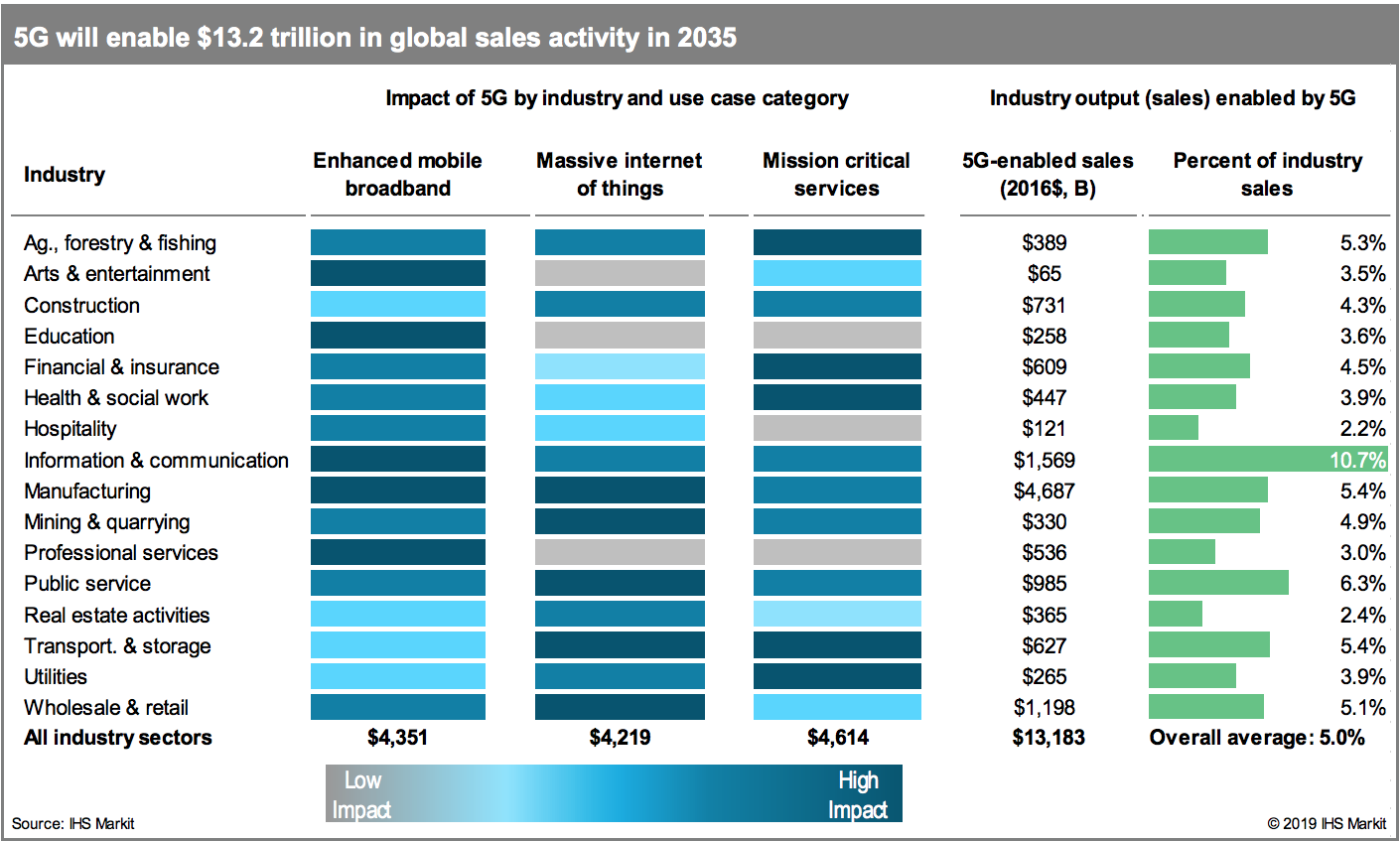What 5G means for your business

First there was 1G and it was analogue.
When you think back to 1G you probably associate it with the ‘brick’ mobile phones from the 80s. Then 2G arrived, bringing SMS and voicemail to our daily routine. 3G introduced image sharing, basic mobile web browsing and GPS. But the mobile internet wasn’t fast enough for the large amounts of data we were transferring, so 4G arrived offering much faster speeds.
And that brings us to 5G.
The fifth generation of mobile networks, 5G is already available in some Victorian locations. As with any new technology, businesses prepared to use it to transform their products, services and internal processes will have a competitive advantage.
What is 5G?
Put simply, 5G takes advantage of higher-frequency bands in the radio spectrum that have lots of capacity but shorter wavelengths. Think F1, not Toyota Corolla.
The relationship can be compared to how FM radio was introduced after AM. While 5G will be widely available in the near future, 4G will still play a role in coverage when 5G isn’t available, particularly in rural areas.
Here’s a rundown of seven 5G features that make it a game-changer.
- Faster speed – At its theoretical maximum speed, 5G is up to 100 times faster than 4G networks (10Gbps compared to 100Mbps). At that speed, you could download an HD movie in under 10 seconds. Practically, we’re more likely to experience speeds about 10x faster than current 4G services. The discrepancy is explained by where you are located and how dense the network is in your location. 4G users will have a knock-on effect of faster network speeds as more users and devices move to 5G networks.
- Lower latency – 5G should have a latency of 1 millisecond or less compared to around 40-50 milliseconds with 4G. This delay is unnoticeable to the human ear and eye. You know that lag when news anchors speak to reporters on location? Gone with 5G.
- Greater capacity – The 5G network can cope with many high demand devices all at once; one million devices per square kilometre to be exact, which is 10 times more than 4G. This will probably mean your mobile data works better on your packed commute, but it also paves the way for homes and businesses to have internet of things (IoT) devices connected to the network.
- Reliability – 5G is being described as ‘ultra-reliable’ or 99.999% reliability. For a start, this means when you facetime friends around the world, the video won’t drop out.
- Flexibility – Network slicing on 5G allows a physical network to be divided into multiple virtual networks so the operator can use the right ‘slice’ for their requirements. This means your business could potentially own its own 5G network, precisely set up according to business needs.
- Mobility – 5G supports mobility up to 500 km/h with low interruption time. So your bullet train or self-driving car won’t lose connectivity.
- Improved battery life – Sound like your battery will die in an hour once it’s tapped into the 5G network? Think again. Increased network efficiency means energy consumption of mobile networks won’t necessarily increase. In fact, it’s being tipped that battery life will be extended by up to ten times.
6 ways to prepare your business for 5G
5G is shaping up to have a dramatic impact on all business.
Just take in this infographic from a report which offers an independent assessment of the importance of 5G technology to the global economy through 2035.

So here’s how to prepare.
1. Keep on top of 5G learning
We can only cover the tip of the 5G iceberg here. We’re still at the beginning of 5G and although a lot of business use cases are under consideration, nothing is off the shelf yet.
There’s a lot more to learn about 5G, much of it particular to your industry. That will continually change as industries find new ways in which to develop products and solutions that leverage 5G. Business leaders need to be on the lookout for ways 5G might support business goals and provide new opportunities.
Some industries already preparing new tech use cases for 5G include manufacturing, energy and utilities, agriculture, retail, financial services, healthcare, transportation, and media and entertainment. But all businesses should be prepared.
Researching use cases for new technology could help a new business find niche markets created by 5G. Or it might enable an established business to find efficiencies, cut costs or value add experiences for their customers.
One practical way of staying on top of 5G is to assign one person in the business to be a 5G lead. This person can regularly research and report on 5G and its impact on your business and industry, while holding regular 5G meetings with senior staff to get everyone involved and excited about opportunities, and make sure your business is taking advantage of the technology as it develops.
2. Create a 5G strategy
Since 5G allows for such large amounts of data to be transferred quickly, it is also set to usher in wider spread use of new technologies. Any business taking advantage of the opportunities arising from driverless cars, drones, Artificial Intelligence (AI), robotics, remote-controlled machinery, and augmented and virtual reality (AR/VR) will have a clear competitive advantage.
For example, 5G enabled automation will be used to create business and manufacturing efficiencies while artificial intelligence will be used to reduce manual processes. Start planning for how automation and artificial intelligence might help your business.
5G enabled AR/VR will be used to add value or market to customers. This is a great time to think about how new technologies might be used to innovate your products and services or cut costs in your business.
Also, make sure your data analytics tools and systems are ready to get insights from the huge amount of data coming with 5G, automation and artificial intelligence.
Companies who are building a roadmap for these new technologies in their business now will be better prepared to take advantage than those investing only a little or nothing at all.
3. Prepare your IT systems
5G and all mobile networks that come after it will use a lot of virtualisation so now is the time to transfer IT systems to the cloud if you haven’t already. You’ll also want to move to the cloud to allow for high speeds and ease when remote working.
If you’re still using on-premise IT infrastructure, you will quickly find your business falling behind those taking advantage of cloud technologies.
If you’re not already on NBN or not happy with the NBN available to you, talk to your current telecom provider about 5G. If they’re not best placed to deliver 5G to your locale, it’s time to start shopping around for a provider that is.
Your telecom provider plays an important role in the speed and reliability of your internet connection, so start collaborating early when new technologies become available.
4. Plan work culture around 5G
In addition to new tech opportunities and transforming IT systems, 5G will continue to change the way we work.
Employees will be increasingly comfortable and productive working on the road or remotely. Networks in the cloud combined with fast file transfer speeds mean there will be a reduced need to be in the office to get work done. AR/VR and seamless connectivity could make remote meetings no different than face to face meetings.
This opens up the opportunity for a variety of flexible working arrangements.
It also democratises the hiring process, making it easier than ever to hire employees who are the best match for your business no matter where they are located.
5. Update your cybersecurity
With great opportunity also comes a great threat.
With more devices and faster connectivity than ever before, we will also experience more possible openings for cyberattacks.
As you prepare for 5G, don’t forget to consider cybersecurity for every new IT system, every remote working process and every new product or service that uses these new technologies.
Start now with an asset management system. Record every business asset that may be susceptible to a cyberattack and then make sure you have a system in place that protects each one.
Cyber security is crucial, but even the most prepared business will experience cyberattacks, so while you’re at it, prepare a cyberattack incident response plan for various scenarios. That way everyone knows what to do should an incident happen.
6. Budget for 5G investment
5G may cut costs over time, but there’s going to be an initial investment.
5G hardware will cost your business money, so if you haven’t already, start budgeting for this initial layout now. That way, when Australia has its full-scale 5G launch, your company will be prepared with 5G-ready equipment.
If you’re looking at new technology opportunities, these will also need to be budgeted for, and make sure you budget for some trial and error as well.
While you’re at it, start predicting how 5G might save you money.
5G is coming so take advantage
5G isn’t just another new technology, it’s shaping up to be THE technology that sets the stage for the internet of things (IoT) – the idea that interconnected computing devices will be installed in many of the objects we interact with every day.
This makes 5G a huge player in the future of almost all industries. According to this Qualcomm report and Ronan Dunne, Executive Vice President and CEO of Verizon Consumer Group, “By 2035, 5G will enable $12.3 trillion of global economic output and support 22 million jobs worldwide.”
In other words, if you’re not looking to take advantage of all that 5G has to offer, someone else in your industry will.
We’ve just crossed the starting line of the 5G race, but the next generation of mobile networks, the IoT and all the tech that becomes possible with them, are speeding up ahead.
Don’t wait to start thinking and planning for how 5G can supercharge your business.